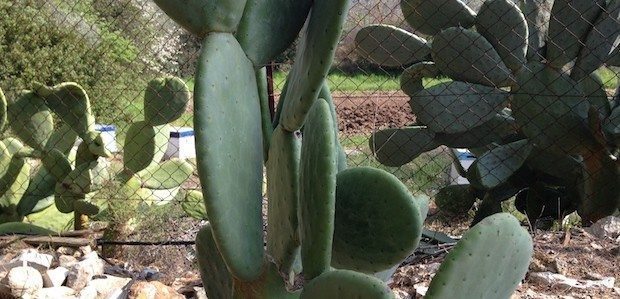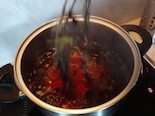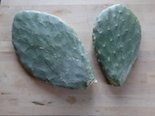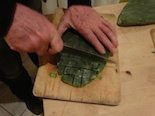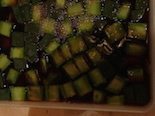The prickly pear cactus and its benefits
Crisis and climate change challenges us to look for new, healthy and more sustainable ways of living. Appreciating and growing ‘new’ food like cacti is an example of this search in Greece.
Over Easter a friend from Chios visited us. He earns his living in an artistic way and as a farmer. His new project is planting fields of prickly pear cacti, in Greek φραγκόσυκα. You often see them along the road and after flowering they produce edible fruits. What I didn’t know is that you can eat the leaves as well. And I was astonished when I heard about the benefits of this plant.
The origin of the prickly pear is from Mexico. It came to the Mediterranean by the Spanish explorers in 1500 AD . The plant is highly resistant to aridity and is simultaneously high productive in biomass. The plant’s need for water is minimal, which makes it suitable for cultivation in Greece. Moreover the cactus has no enemies and the farming costs can be kept low.
According to a study, published in the January 2006 „Journal of Pharmacy and Pharmacology“, researchers found that prickly pear cactus demonstrated strong antioxidant and anti-inflammatory activity. Another study found that prickly pear extract may decrease blood glucose levels in patients with type 2 diabetes.
In Mexican folk medicine, the cactus pulp and juice are used to treat skin wounds, stomach swelling, digestive problems and urinary tract infections.
Also not unimportant if you love to party the natural extract seems to be a useful remedy for alcohol hangovers.
Making tea and salad with the cactus leaves
So after our friend told us about his new φραγκόσυκα project, we went outside to find the plant and cut some of its leaves.
One way to use the leaves is to add them to a herb tea. First you make a nice herb tea, as you wish and let it cool down.
Remove the spines and hairlike prickles from the leaves. Cut away the edges from the leaves and cut the leaves in small cubes. Add them to the cold tea and put it in the fridge for a night. The tea becomes jelly like. Next day you can start drinking the tea by taking the juice and heat it up. Don’t let it boil. You can keep the tea with the cactus cubes for a couple of days in the fridge.
The cactus cubes can be used for a salad or as a base for a vegetable dish. Just remove the hard edges. It taste something like between a cucumber and green beans.
Last but not least the jelly-like juice can be used as hair-conditioner and as body lotion.
Enjoy the benefits of this new super food. In Greece it is easy to collect some leaves when you go out for a walk and find some cacti on your way.


